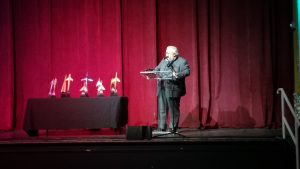At the world science fiction convention just past, MidAmeriCon II, an event occurred which may well displace much more deserving matters, but which was significant enough to spark dialogue over a subject that has been at the center of debate within the science fiction field for several years now. A debate which regrettably led to the attempt to “game” the Hugo Awards by a disaffected element determined to deny the validity of current trends in new writings.
I refer, of course, to the Sad Puppies and their subsequent impressment by the Rabid Puppy movement, which was more or less the sole creation of one person who took advantage of the situation to push slates onto the Hugo ballots and otherwise poison the pool of discourse with a degree of venom that has adversely affected those among the Sad Puppies who argued these issues in good faith and on the merits of the fiction produced. Actions have been taken to see that slates are no longer likely and the entire consequence of this year’s Hugo Awards seems to have been nothing less than a massive repudiation by fandom in general of the whole argument that science fiction is being “ruined” by certain kinds of fiction at the expense of “truer”, somehow purer SF of a more traditional variety.
However that aspect of all this may eventually sort itself out remains to be seen. Debates over story content, style, approach, the æsthetics of the genre will continue and all to the good of what continues to be a vibrant, vital art form.
For now, though, I want to talk about the event mentioned above. There was a panel called, I believe, The State of Short Fiction. By second-hand accounts it turned into a row due to the upfront introductory speech by its moderator, Dave Truesdale, who took the opportunity to make a statement consistent with Sad Puppy sentiments and to derogate what he called Snowflakes whose sensibilities seem so delicate that they had to attack or censor what I presume he considers more robust, “traditional” SF. He proferred a string of pearls “to clutch” should “the vapors” threaten them when confronted with arguments that their preferred form of fiction might not be good for the field.
Not finished with this opening salvo, the other panelists, who included among the best editors in the field today, interrupted and tried to pull the panel back to the topic. You can listen to the whole thing online. I will not link to because there is some question over whether Mr. Truesdale had permission to record and post it. If you wish to go look for it, feel free.
The panel never did get onto its topic, but it did become very interesting.
However, one result was that Mr. Truesdale was expelled from the convention. On the surface, this appears to be an overreaction. If part of the intent was to punish him for an inappropriate message, it has backfired. Even if that was not the intent, it has resulted in this panel receiving substantially more attention than some might wish.
Whatever one’s feelings about that, what I wish to discuss here concerns the points Mr. Truesdale was trying to make regarding SF and this whole subject of “ruining” SF.
This is not the first time by a long shot that this has enveloped the SF community. At the very first worldcon there was such dispute among the fans that one faction called the police to bar the other from even getting into the hotel, all over the direction science fiction would take. SF readers are passionate. Passions have overwhelmed intellect more than a few times.
There are several aspects of Mr. Truesdale’s assertions that require examination. I’ll deal first with his claims that SF is being “ruined.”
The question is, How? Right now, especially in short fiction, the outlets are so many and so varied, discerning any kind of “trend” is virtually impossible, a point made by Gordon Van Gelder (F & SF) during the panel. At one time, as he explained, you could discern a direction because the field was dominated by three or four major magazines and a handful of original anthologies. What saw print in these outlets contoured the public perception of what constituted science fiction (and fantasy). Now? While those magazines still exist, there are many more and online publishing has expanded the pool of story outlets so much that the field is in continual froth. Any look at the table of contents of the several Best of the Year annuals shows very little overlap, and yet each one can legitimately claim to showcase the best in the field for a given year. Reading those annuals…
Here is where personal taste enters into it to a large degree. But only to a degree. I have been reading science fiction since I was ten years old. That’s fifty one years. I no longer read as widely in short fiction as I once did, and in some years I have read nothing in less than novel length. But when I have come back to short fiction, I have generally been pleased to see improvement over what went before. Improvement in craft, in concept, in execution. The stories have widened their scope, become more inclusive in terms of subject matter and sentiment, characterization has deepened, and overall there has been a marked maturation.
When I became well enough acquainted with the field to follow it as a literary movement, I became aware of the insecurities manifest in the relationship of SF with the wider reading public. What became known as the SF Ghetto was at one time a very real thing. What we call mainstream tended to regard the genres as a whole and SF specifically as the redheaded stepchild of “real” literature. That began to change after the New Wave ructions of the mid to late Sixties and the eventual absorption of those experiments in the body of SF writing throughout the Seventies, until by the end of the Eighties it was becoming evident that SF could not be so relegated to the sidelines by the mainstream. The result is that today, mainstream has taken SF into itself and writers who otherwise would never be considered SF writers are writing solid science fiction and selling it to mainstream audiences. The “culture war” to gain validation and legitimacy for our field has been won.
That seems to underlie the disaffection of the group within SF that goes by the Sad Puppy label. The stories now being written, published, and lauded as science fiction at its best seem no longer to express their preferred idioms or æsthetic concerns. Even as several of them appear to do quite well in terms of sales and fan support, the quest of winning awards for their preferred work is becoming less and less achievable. Even as some of their novels sell well enough that they might make their living on them, no one is nominating them in sufficient numbers to secure a spot on the final ballot of the premier awards.
Instead, according to them, the awards are going to works which seem to have little to do with science fiction or express viewpoints at odds with their politics, their cultural assumptions, and their personal values.
Exactly what are those politics, assumptions, and values?
Mr. Truesdale, during an exchange at the panel, asked what I consider the telling question: “Where is all the conservative SF?”
In all seriousness, I don’t know what that means.
Science fiction, by its nature, is radical. It takes apart the given world and replaces it with something else. That is as basic as change can get. That is anything but conservative. And that is what it has always been. It may well be that writers have used conservative viewpoints for their characters, but even then there is a presumption that the world is no longer the same.
And if a writer uses a form to push a set of political principles, it usually turns out to be bad fiction. Propaganda.
Science fiction has always been about how the world will be different. That is as not conservative as one can get.
Science fiction is progressive. Now, sometimes the progress fails, the experiment collapses, things go wrong. Post-apocalyptic SF is all about that and one might see a lot of it in a certain way “conservative” insofar as the specific requirements of survival become essential to the plot. But the goal is to rebuild and make it better, but almost never the same—since The Same would emulate the world that failed.
But back to that question.
If you write a story that is true to the characters in the story—and good fiction is about its characters and their situation—then how do you make it one thing or the other without auctorially interceding and making it something it may not organically be about?
I do not, however, believe that is what was meant by that question. Context is vital and given the context not only of the SF community but of the world at large, I can only read that question as meaning “Where are the stories about how great our past visions of the future are?”
Past visions of the future.
A great deal of the fiction being published by those who are self-proclaimed Sad Puppies tends to be of the military SF variety. Not all, but a lot. A few examples contain overt missionary elements.
Briefly, the so-called Golden Age, while in no way monolithic, is best remembered by its planetary romance, its space opera, its colonial æsthetics. We were going to stars to settle new worlds, conquer aliens if need be, and, at least under the overt programmatic editorialism of John W. Campbell Jr., prove our superiority over any and all.
I doubt anyone would argue that colonialism was not a major aspect of that era. Imperialism informed a lot of it. In many instances, it seems t have been an unexamined given.
Quite a bit of newer fiction is in fact about the consequences of such questions. Counter-colonialism, post-imperialist examinations of costs and calamities, and a study of the underlying psychologies and assumptions appertaining to much of what we recognize as Golden Age SF. (To be fair, a lot of that SF also questioned these things, but somehow that was okay, perhaps because the “right” people were writing those stories. More on that later.)
I wrote about how my reading tastes have evolved here, so I won’t rehash. What I will say here is that the complaints about a lack of “ol’ time rockets-n-rayguns” SF seems disingenuous at best. I’ve been reading the new Expanse series by James S.A. Corey and given that these books are now the basis of a tv series and seem to sell quite well, the popularity of this kind of SF seems not at all diminished. (Unless for some arcane reason these books don’t fill the bill, in which case further explication is needed from those complaining.) Indeed, given the broad parameters of the complaints, the novel that prompted particular ire a couple of years back, Ann Leckie’s Ancillary Justice, seems also to fit within the stated parameters of the fiction claimed lacking in the field. The only complaint about that book, which sparked considerable anger in certain quarters, that was in any way specific was that it was poorly-written. I disagree. It did its job very well. But again, that’s personal taste.
(I will claim to have some experience both as a reader and a writer with good and bad prose and feel I have the requisite standards, at least for myself, to determine which is which and often why. There’s nothing second-rate or poorly-written about Leckie’s work. I suggested in a review what the real problem was and given the nature of further criticisms of the field, especially the tactic Mr. Truesdale used to launch his attack, I will stand by it.)
The clutched pearls and charges of “vapors”, whether he intended it this way or not, are symbols directly targeting women. “Vapors” is an old-fashioned affliction suffered, presumably, by women and the effeminate. Like it or not, there is no other way to read it. Clutching pearls added another layer to that. The problem, therefore, must, per this diatribe, be women or the feminization of the genre. There was a general not long ago who complained about feminization of the military because medals were given to soldiers who saved lives rather than “broke things like they were supposed to.” Given that the chief targets in the last few years of the Sad Puppies and their supporters seem to be largely if not entirely women—specific novels and stories held up as examples of “what’s wrong with the field” have all been written by women—it is fair to conclude that Mr. Truesdale rode that tide onto the beach. It is fitting therefore that it was a woman who initially took him to task (Sheila Williams, editor of Asimovs SF).
Two things about this from a cultural standpoint. Dominant members of a culture get frantic when the numbers of what had previously been minority or exception representations rise to levels where they can no longer be passed off as Special Cases. The visibility of women and minorities in SF has been going up for decades. It may be that a critical threshold has been reached and passed and they must now be regarded as normative examples of work being done. Hence the spleen vented by those claiming privileges for “traditional” writing.
The other thing is a bit trickier. It may well be that the future is no longer safe for those same traditionalists. Not even 20 years ago one could assume that the futures being written about would not manifest in our lifetimes. Certainly 40, 50, or 70 years ago one could very safely write about all manner of social change and economic and cultural novelties and still assume that the world outside one’s door would never get anywhere near any of it. I recall an essay by Harlan Ellison wherein he had an encounter with John W. Campbell’s wife concerning Jimi Hendrix and a similar point was made. The Future was not something she was ready to embrace, especially not one exemplified by the new music and the social changes it represented.
But that safe distance is gone. Except for starships and actual nonhumans (and maybe time travel) we are living in the future imagined by those writers and it is evident that tomorrow will be another future sitting right on our doorstep. In many ways, it isn’t fiction anymore.
And now the fiction calls into question safe assumptions about the hegemony of those past futures imagined but perhaps, by many, not desired.
Personally, I find all this angst over the direction of science fiction a dubious exercise in attempted grandstanding. The works speak for themselves and the accolades garnered are symptomatic of public tastes, except in those instances of collegial recognition, like the Nebula. Charges that cabals bar people or works from competition fall apart on the basis of who is doing the selecting.
But partly this is a consequence of the dissolution of boundaries currently going on by virtue of the fact that, to put it crudely, science fiction won. Emily St. John Mandel, Eric Cline, David Mitchell, Margaret Atwood, Kate Atkinson, Helen Phillips, Ben Winters, and on and on are all writing recognizable science fiction and doing a masterful job of it. They are not “in the club” as it were and therefore not “of the chosen.” That old complaint about the ghetto is now not so much a complaint of being kept in but an attempt to keep Them out. The ghetto walls have fallen and SF writers are not solely the bearers if cool futures. Others are writing in what once was a small pool where the comradeship of the besieged provided the basis of a shared experience.
But back to that singular question, “where is all the conservative science fiction?” Where has it ever been?
The problem is that today, in the current climate, the kinds of works that emerge as examples of conservative SF seem to be—I stress, seem to be—military SF. Is that the only hallmark we go by anymore? The insistence that war will not only happen but that our heroes must necessarily be those not only skilled at it but quickly willing to step forward to engage it is a questionable basis for dominating what has become a radically diverse field of literature. It bears some similarity to arguments about what may or may not be “real” rock’n’roll, which as time went on become an increasingly impossible argument to win.
Damon Knight once said “science fiction is what I point at when I say the words.” Going back and looking at the best of the field, that has always been true.
So what are the issues?
In my opinion, nothing that has anything to do with the stories being written and published other than by extension. Unfortunate as it may be, the criticisms being leveled seem to come back to who is writing them and what they are writing about that contradicts a preferred cultural narrative. (When I hear criticism of a novel that for all intents and purposes is exactly the kind of work being argued for that it is bad SF because it is supposedly a social justice novel, when it is not, and the only things that separate it from the preferred model is a pronoun shift and sexual ambiguities, I cannot but conclude that the criticism is entirely a reaction to a perceived threat to a present-day norm which is not even being called into question within the novel. Transference, anyone?)Â And not even that so much as what stories are winning awards, which is an especially small aspect of the larger project.
At the end of the day, the “snowflakes” would appear to be those who are reacting to stories that criticize the Golden Age cultural assumptions, not the writers of those stories, nor, in my experience, those rewarding said stories. These stories are talking about matters at hand in new ways and leveling criticisms at issues. Their detractors seem more concerned with who is writing them. I do recall a tradition in SF of writing stories in response. I wonder what happened to that?
Of course, that presupposes a good story.










